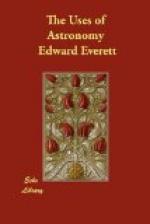There are occasions in life in which a great mind lives years of rapt enjoyment in a moment. I can fancy the emotions of Galileo, when, first raising the newly-constructed telescope to the heavens, he saw fulfilled the grand prophecy of Copernicus, and beheld the planet Venus crescent like the moon. It was such another moment as that when the immortal printers of Mentz and Strasburg received the first copy of the Bible into their hands, the work of their divine art; like that when Columbus, through the gray dawn of the 12th of October, 1492 (Copernicus, at the age of eighteen, was then a student at Cracow), beheld the shores of San Salvador; like that when the law of gravitation first revealed itself to the intellect of Newton; like that when Franklin saw by the stiffening fibers of the hempen cord of his kite, that he held the lightning in his grasp; like that when Leverrier received back from Berlin the tidings that the predicted planet was found.
Yes, noble Galileo, thou art right, E pur si muove. “It does move.” Bigots may make thee recant it; but it moves, nevertheless. Yes, the earth moves, and the planets move, and the mighty waters move, and the great sweeping tides of air move, and the empires of men move, and the world of thought moves, ever onward and upward to higher facts and bolder theories. The Inquisition may seal thy lips, but they can no more stop the progress of the great truth propounded by Copernicus, and demonstrated by thee, than they can stop the revolving earth.
Close now, venerable sage, that sightless, tearful eye; it has seen what man never before saw—it has seen enough. Hang up that poor little spy-glass—it has done its work. Not Herschell nor Rosse have, comparatively, done more. Franciscans and Dominicans deride thy discoveries now; but the time will come when, from two hundred observatories in Europe and America, the glorious artillery of science shall nightly assault the skies, but they shall gain no conquests in those glittering fields before which thine shall be forgotten. Rest in peace, great Columbus of the heavens—like him scorned, persecuted, broken-hearted!—in other ages, in distant hemispheres, when the votaries of science, with solemn acts of consecration, shall dedicate their stately edifices to the cause of knowledge and truth, thy name shall be mentioned with honor.
NEW PERIODS IN ASTRONOMICAL SCIENCE.
It is not my intention, in dwelling with such emphasis upon the invention of the telescope, to ascribe undue importance, in promoting the advancement of science, to the increase of instrumental power. Too much, indeed, cannot be said of the service rendered by its first application in confirming and bringing into general repute the Copernican system; but for a considerable time, little more was effected by the wondrous instrument than the gratification of curiosity and taste, by the inspection of the planetary phases, and the addition of the rings and satellites of Saturn to the solar family. Newton, prematurely despairing of any further improvement in the refracting telescope, applied the principle of reflection; and the nicer observations now made, no doubt, hastened the maturity of his great discovery of the law of gravitation; but that discovery was the work of his transcendent genius and consummate skill.




